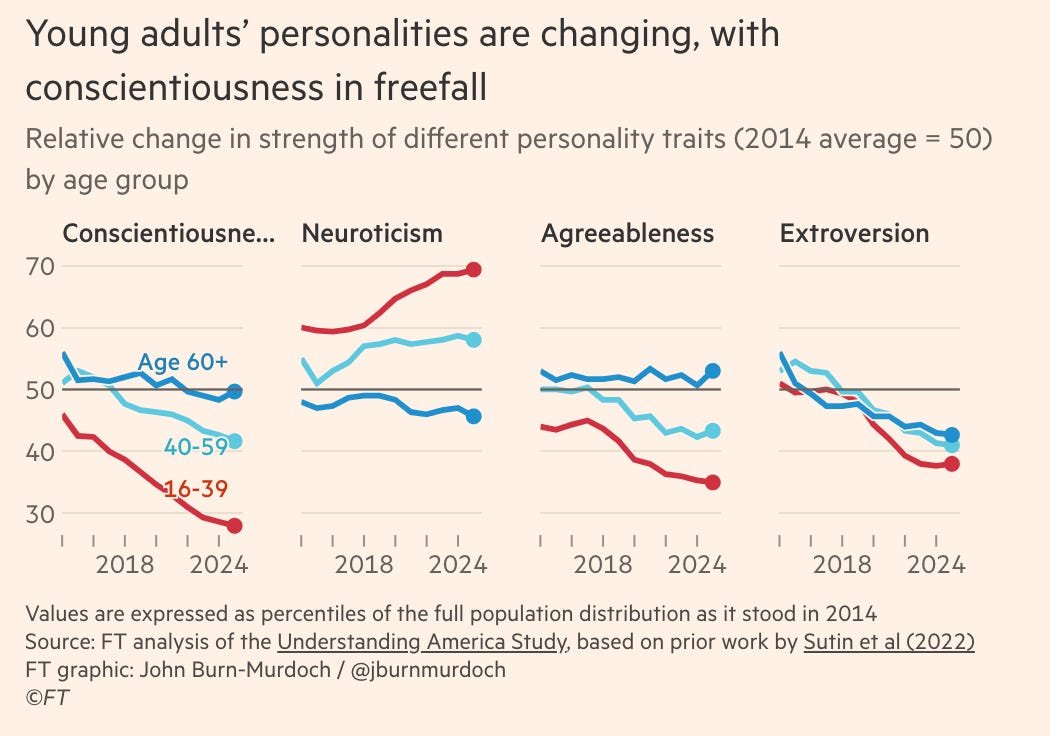The Conscientiousness Crisis: Why Character Beats Competence in Leadership (And What Kirk Cousins Taught Us About Handling Setbacks)
This article is from our recent “Situational Awareness” episode on the Lead Together podcast titled, “Character Beats Competence: What Kirk Cousins, a Kids Movie, and Declining Conscientiousness Teach Us About Leadership”. Listen here.
You're watching your team struggle with follow-through. Projects that should take two weeks stretch into months. Younger employees seem to need more hand-holding than ever before. Meanwhile, at home, your kids bail on commitments the moment things get difficult.
You're not imagining it. Recent Financial Times research reveals a startling trend: conscientiousness—the character trait that predicts career success better than intelligence or socioeconomic background—is plummeting among younger generations.
Here's what's happening, why it matters for your leadership, and what Kirk Cousins, a children's movie, and emerging research teach us about building resilience in others.
The Character Crisis Hiding in Plain Sight
New data shows people in their twenties and thirties increasingly report feeling:
Easily distracted and careless
Less tenacious and likely to deliver on commitments
More anxious and emotionally unstable
Less helpful and more argumentative
More introverted than any previous generation
If you're leading people in this demographic—or raising kids who will enter this environment—this isn't just a workplace issue. It's a cultural shift that affects everything from marriage satisfaction to career longevity.
The stakes? Conscientious people live longer, have more career success, better marriages, and even keep their jobs during recessions. Character literally shapes outcomes more than talent or background.
What Kirk Cousins Taught Us About Resilience
Netflix's Quarterback Season 2 provided an unexpected masterclass in handling setbacks. When Kirk Cousins got benched late in the season after struggling through several games, his response revealed the kind of character that creates lasting success.
Instead of sulking or creating drama, Cousins:
Called his replacement to offer encouragement
Committed to being the best scout team quarterback in the league
Led with a team-first attitude despite personal disappointment
His wife Julie provided steady support without enabling self-pity. Together, they modeled how to process disappointment honestly while maintaining forward momentum.
The contrast with younger players was stark. While others threw equipment and cursed their situations, Cousins chose grace and professionalism.
The Kirk Cousins Leadership Framework
1. Own Your Response "I have one option," Cousins said about his benching. He chose to control what he could control—his attitude and effort—rather than dwelling on what he couldn't.
2. Serve Something Bigger Rather than making it about himself, Cousins focused on how he could still contribute to team success. He shifted from "How does this affect me?" to "How can I add value?"
3. Maintain Long-Term Perspective Grounded in his faith, Cousins viewed the setback as part of a larger story, not the end of it. "God is the owner and I'm the steward," he reflected.
The Home-Work Connection: Building Character Where It Counts
The same principles that create workplace resilience apply at home. In fact, the family is where character gets formed first.
The Sketch Movie Lesson: Holding Good and Bad Together
Angel Studios' recent film Sketch beautifully illustrates this principle. When a young girl processes grief through dark drawings that come to life, the resolution isn't to eliminate the difficult emotions or have everything return to "normal."
Instead, her father reminds her that life requires "a mixture of good and bad." The family learns to work together, holding both grief and wonder, loss and hope.
Key insight: Resilient people don't avoid difficulty—they learn to hold complexity without being overwhelmed by it.
Practical Strategies for Leaders
For Your Team
1. Provide Structure Without Micromanaging Younger employees need more scaffolding but resist feeling controlled. Create clear systems, deadlines, and checkpoints while explaining the "why" behind each task.
2. Connect Work to Purpose In an increasingly nihilistic culture, help team members see how their contributions create impact. Share stories of how their work affects real people.
3. Model Emotional Regulation In Edwin Friedman's terms, be "the least anxious person in the room." Your stability becomes the foundation others can build on.
4. Celebrate Character, Not Just Results Acknowledge follow-through, resilience, and team-first attitudes. What gets celebrated gets repeated.
For Your Family
1. Make Follow-Through Non-Negotiable When your child commits to a sports season or activity, help them complete it even when motivation wanes. The team is counting on them.
2. Resist Rescue Instincts Let natural consequences teach lessons about responsibility. Don't bail them out of self-created problems.
3. Create Embodied Experiences Regular hikes, camping trips, or device-free activities help kids develop emotional regulation and presence.
4. Model What You Want to See Let them watch you do boring, necessary tasks. Show them what faithful stewardship looks like in ordinary moments.
The Integration Imperative
Here's what ties it all together: Character is revealed in how you handle what you don't choose.
Kirk Cousins didn't choose to be benched. The kids in Sketch didn't choose to lose their mother. Gen Z didn't choose to grow up during a pandemic with smartphones.
But in each case, character was revealed and developed through the response.
As leaders, we're stewards of character development—both our own and others'. This isn't about becoming drill sergeants or eliminating compassion. It's about creating environments where people can grow stronger through challenges rather than being broken by them.
Your Next Steps This Week
At Work:
Identify one area where you can improve your own follow-through
Have a conversation with a younger team member about connecting their work to larger purpose
Implement one new structure or system that provides clarity without micromanaging
At Home:
Look for an opportunity to let your child complete something difficult rather than rescuing them
Plan one device-free, embodied family experience
Let your kids see you doing mundane but necessary work
For Yourself:
Reflect on a current challenge: How can you respond like Kirk Cousins rather than reacting emotionally?
Consider what "holding good and bad together" looks like in your current season
The Bottom Line
In a world where conscientiousness is declining, leaders who can develop it in others become incredibly valuable. While AI may eventually replicate knowledge work, character remains distinctly human.
The quality of your life and leadership truly does depend on the quality of your relationships—and relationships are built on character traits like reliability, emotional stability, and follow-through.
Whether you're managing a team struggling with accountability or raising kids in a culture that celebrates quitting when things get hard, the principles remain the same: model what you want to see, create supportive structure, and help others see their setbacks as part of a larger story worth living.
Ready to build these character-based leadership skills in your team or family? The principles are clear, but implementation requires intentionality and often outside perspective. That's where coaching makes the difference between knowing what to do and actually doing it consistently.
Book a strategy call to discuss how these frameworks can transform your specific leadership challenges—both at work and at home.



